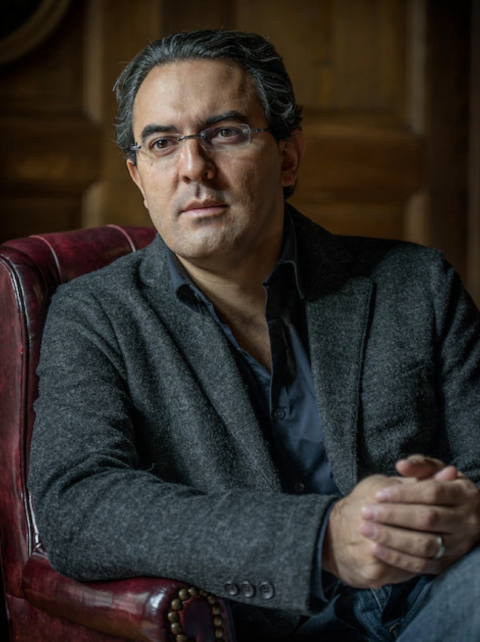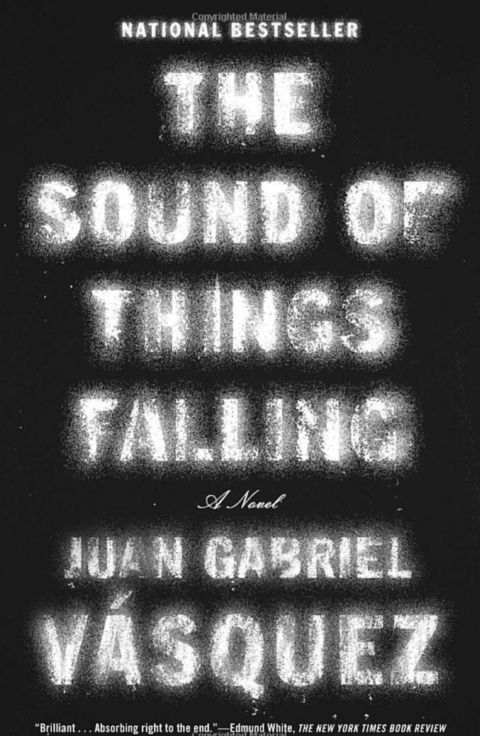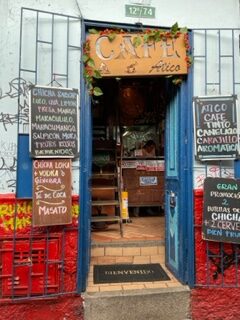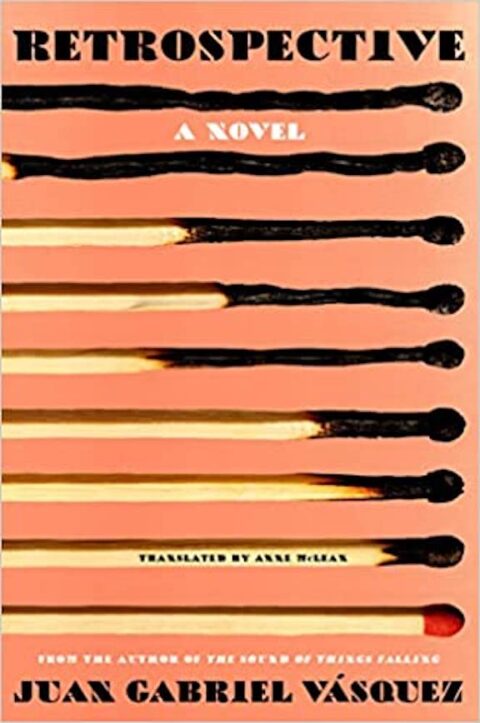Writing in the Times Literary Supplement, David Gallagher asserted, “Juan Gabriel Vásquez is one of the most impressive novelists currently writing in Latin America. He is a beacon for a generation of Colombian authors who have been wrestling themselves from the influence of Gabriel García Márquez …” Vásquez has clearly succeeded in differentiating his style from that of Márquez’s and the Latin American Boom generation. Although he writes with bracing directness about the tortured history of Colombia, Vásquez also creates characters who face danger regardless of gender, nationality, social class, or political affiliation. His novels are set in cities like Bogotá and historic neighborhoods like La Candelaria, not in fictitious towns like Macondo. Vásquez’s novels include The Shape of the Ruins, shortlisted for the 2019 International Man Booker Prize; Reputations, a New York Times Best Book of the Year, and The Sound of Things Falling, a national bestseller and winner of the 2014 International Dublin Literary Award. His work has been published in 25 languages. Recently, two of his novels drew my attention — The Sound of Things Falling (2014) and Retrospective (2023), both translated by Anne McLean.
 While in Retrospective Vásquez writes about the life of film director Sergio Cabrera, in The Sound of Things Falling the fictitious characters Antonio Yammara and Ricardo Laverde seem as real and full of contradictions as Cabrera. Both novels demonstrate that Vásquez possesses the authority to be the chronicler of the Colombian story or stories. His writing is clear and concise, though also lyrical; the anecdotes he includes in his novels don’t unfold in chronological order, but rather in a recursive style. He often returns to painful episodes that alter his characters’ lives. This technique also pertains to The Sound of Things Falling. Gallagher observed, “We read of episodes in the characters’ lives, but we only begin to understand them when we subsequently read of a previous episode. As we go back in time our understanding increases, usually to our great surprise, because it gradually becomes clear that the characters’ pasts are vastly different from anything we had initially imagined.”
While in Retrospective Vásquez writes about the life of film director Sergio Cabrera, in The Sound of Things Falling the fictitious characters Antonio Yammara and Ricardo Laverde seem as real and full of contradictions as Cabrera. Both novels demonstrate that Vásquez possesses the authority to be the chronicler of the Colombian story or stories. His writing is clear and concise, though also lyrical; the anecdotes he includes in his novels don’t unfold in chronological order, but rather in a recursive style. He often returns to painful episodes that alter his characters’ lives. This technique also pertains to The Sound of Things Falling. Gallagher observed, “We read of episodes in the characters’ lives, but we only begin to understand them when we subsequently read of a previous episode. As we go back in time our understanding increases, usually to our great surprise, because it gradually becomes clear that the characters’ pasts are vastly different from anything we had initially imagined.”
For instance, six pages into The Sound of Things Falling, Antonio Yammara, the narrator, describes the day Ricardo Laverde died:
“The day of his death, at the beginning of 1996, Ricardo Laverde had spent the morning walking the narrow sidewalks of La Candelaria, in the center of Bogotá, between old houses with clay roof tiles and unread marble plaques with summaries of historic events, and around one in the afternoon he showed up at the billiards club on 14th Street, ready to play a couple of games with some of the regulars. He didn’t seem nervous or disturbed when he started to play …”
It is in this billiards club that Yammara meets Laverde. They spend afternoons and evenings playing and drinking, getting to know each other, until the fateful day when Laverde is murdered and Yammara wounded by hired assassins while walking down a street in La Candelaria. Until then, Yammara never suspects that this casual friendship will change his life forever.
However, we do not read the description of Laverde’s murder until page 45, when Yammara says: “Then I saw the motorbike dropping down onto the road like a bucking horse, saw it accelerate to approach like a tourist looking for an address, and at the precise moment when I grabbed Laverde’s arm, when my hand clutched at the sleeve of his coat by his left elbow, I saw the faceless heads looking at us and the pistol pointed toward us as naturally as a metal prosthesis, and saw two shots, and heard the explosions and felt the sudden tremor in the air.”
“Felt the sudden tremor in the air” could very well be a line or phrase in a poem by Colombian poet Aurelio Arturo, whom Vásquez quotes in one of the last chapters of the novel:
I will tell you that
one day I saw a crazed, arrogant, swarming city
burn through the night
Unblinking, I watched it collapse,
and fold like a rose petal under a hoof.
As Yammara points out, when this poem was published in 1929, Arturo “had no way of knowing what would … happen to the city of his dream, the way Bogotá would adapt itself to his lines, entering into them and fulfilling their requisites, as iron adapts to its mold …” Poetry, present throughout the book, adds nuance and complexity to Vásquez’s portrait of the city; he clearly loves Bogotá and its people, though he also understands that it is, or was, a city of shadows. Besides Arturo, Vásquez quotes José Asunción Silva, a famous modernist poet who committed suicide in his home at the age of 31. It is at the Silva Poetry House, in La Candelaria, where Silva lived and died, and which has now become a cultural organization, that Yammara listens to a recording of “Nocturne,” one of Silva’s most famous poems, while his friend Ricardo Laverde plays a tape with a different recording on it, one which will haunt him until his death, and which will continue to haunt Yammara long after his friend is gone.
 Besieged by the drug war in the 80s and 90s, the Bogotá depicted in The Sound of Things Falling is constantly in turmoil; its citizens are often depicted as ruined by uncontrollable events that seem tangential to their lives. Caught between public and private wars, Vásquez’s characters suffer — incapable, it seems, of escaping their fate. Although this novel seems brief when compared to Retrospective, its pages resonate with themes developed in his other novels, including self-identity, loneliness, family ties, love, loyalty, ambition, tragedy, loss, and the mistakes that affect the course of a person’s life. Since in this novel Vásquez depicts imperfect human beings trying to make sense of life, and because the whole country and its population have been affected in one way or another by the drug war, this is a story about all Colombians.
Besieged by the drug war in the 80s and 90s, the Bogotá depicted in The Sound of Things Falling is constantly in turmoil; its citizens are often depicted as ruined by uncontrollable events that seem tangential to their lives. Caught between public and private wars, Vásquez’s characters suffer — incapable, it seems, of escaping their fate. Although this novel seems brief when compared to Retrospective, its pages resonate with themes developed in his other novels, including self-identity, loneliness, family ties, love, loyalty, ambition, tragedy, loss, and the mistakes that affect the course of a person’s life. Since in this novel Vásquez depicts imperfect human beings trying to make sense of life, and because the whole country and its population have been affected in one way or another by the drug war, this is a story about all Colombians.
The descriptions of his characters’ circumstances stem from firsthand experience. Born and raised in Bogotá, Vásquez studied law at El Rosario University, located in La Candelaria, which often appears in his novels. The Silva Poetry House is located in that neighborhood. Like Yammara, Vásquez fell in love with literature; his thesis in law school was titled Revenge as a Legal Prototype in The Iliad. There is a clear parallel between Vásquez and Yammara, who in the novel describes his own thesis in law school: “ — a thesis on madness as grounds for exemption from legal responsibility in Hamlet: I still wonder today how I got them to accept it, let alone award it a distinction …” However, unlike his main character in The Sound of Things Falling, Vásquez — who is also a journalist and a translator (he writes a column for the Spanish newspaper El País, and his book reviews have appeared in The New York Times and The New Yorker) — left Colombia shortly after completing law school. He spent 16 years in France, Belgium, and Spain before returning to Bogotá. Perhaps his time abroad gave him a deep appreciation of Colombia’s sociopolitical dilemmas, and of the impact the drug war has had on the its people. Only someone with the ability to observe situations from different perspectives would be able to write with such clarity, understanding, and compassion about the diverse tragedies that have besieged his country.
Around Christmas time, following an evening of billiards and drinking, Laverde tells Yammara that his estranged wife, Elena Fritts, is flying in from the United States to see him. “That woman is all I have,” Laverde says, “Don’t ask me to give you details, Yammara, it’s not easy for anyone to talk about his mistakes. I’ve made some, like everyone has.” Laverde and Elena met in Bogotá when she was working for the Peace Corps.
 After New Year’s, when Yammara finds Laverde, his friend doesn’t talk about Elena, but instead shows him a tape and asks where he can listen to it. Yammara can’t think of any other place to take him other than the Silva Poetry House. While his friend listens to the tape, Yammara chooses a recording of Silva’s poem: “And when ‘Nocturne’ began to play,” he says, “when a voice I couldn’t identify — a baritone that verged on melodrama — read that first line that every Colombian has pronounced aloud at least once, I noticed that Ricardo Laverde was crying.” In one of many poetic moments in this novel, Yammara quotes Silva: “And your shadow, lean and languid … And my shadow, cast by the moonbeams.” Silva’s shadows capture the mystery in a world in which duality and ambivalence reign. Yammara struggles to understand Laverde’s life, just as he struggles to understand his own existence, what it means to be a partner and a father.
After New Year’s, when Yammara finds Laverde, his friend doesn’t talk about Elena, but instead shows him a tape and asks where he can listen to it. Yammara can’t think of any other place to take him other than the Silva Poetry House. While his friend listens to the tape, Yammara chooses a recording of Silva’s poem: “And when ‘Nocturne’ began to play,” he says, “when a voice I couldn’t identify — a baritone that verged on melodrama — read that first line that every Colombian has pronounced aloud at least once, I noticed that Ricardo Laverde was crying.” In one of many poetic moments in this novel, Yammara quotes Silva: “And your shadow, lean and languid … And my shadow, cast by the moonbeams.” Silva’s shadows capture the mystery in a world in which duality and ambivalence reign. Yammara struggles to understand Laverde’s life, just as he struggles to understand his own existence, what it means to be a partner and a father.
In Vásquez’s world, wounded individuals struggle to become whole again. Some succeed. While Laverde doesn’t get the chance to make amends before his death, once he has recovered from his physical wounds, Yammara decides to travel to the Magdalena Valley to meet Maya, a woman who has built a life away from the city. After Maya explains Laverde’s life to him, Yammara comes to terms with his friend’s death as well. The trip turns out to be a journey of self-discovery for the young professor, an opportunity to come to peace with his own choices, mistakes past and present. He returns to Bogotá determined to change. Perhaps it’s not too late.
Retrospective relates the life story of Colombian film director, Sergio Cabrera who has directed more than 20 films, including The Strategy of the Snail, and is currently Colombian ambassador to China. The Ford Madox Ford citation at the beginning of the novel provides a glimpse of Vásquez’s philosophy: “For, according to our view of the thing, a novel should be the biography of a man or an affair, and a biography whether of a man or of an affair should be a novel … (preface to “Joseph Conrad: A Personal Remembrance,” 1924).”
 Vásquez shares information about the Cabrera family history, beginning with their Spanish ancestors. Cabrera’s father, Fausto, flees Spain during the Franco era and ends up settling down in Colombia. If it were not obvious from the very beginning that the novel is a retelling of a true story, and that it was written with Sergio Cabrera’s blessing, as well as that of his sister, one would marvel at Vásquez’s ability to invent, and at the depth and breadth of his imagination. What is remarkable, however, is his ability to weave such a complex narrative and to tie it all together in a gratifying way.
Vásquez shares information about the Cabrera family history, beginning with their Spanish ancestors. Cabrera’s father, Fausto, flees Spain during the Franco era and ends up settling down in Colombia. If it were not obvious from the very beginning that the novel is a retelling of a true story, and that it was written with Sergio Cabrera’s blessing, as well as that of his sister, one would marvel at Vásquez’s ability to invent, and at the depth and breadth of his imagination. What is remarkable, however, is his ability to weave such a complex narrative and to tie it all together in a gratifying way.
The novel begins in Barcelona where Cabrera has been invited to speak at a retrospective show featuring his films. While in Spain, Sergio finds out that his father, Fausto, recently died in Bogotá. Sergio is then faced with having to make the decision as to whether he will return to Colombia to attend his father’s funeral or stay in Barcelona to participate in the retrospective organized in his honor. Fausto’s death and Cabrera’s decision concerning the funeral provide the framework for Vásquez’s retelling of the story of the filmmaker’s fascinating life, one that includes years spent living in China during the Cultural Revolution, his training with the Red Army before returning to Colombia, and his decision to join a group of guerrilla fighters along with his father, his mother, and his sister.
Retrospective is about idealism, disappointment, suffering, and regret. It also explores the relationship between parents and their children. We get a vivid glimpse of what Sergio and his sister experienced as teenagers when their parents returned to Colombia, leaving them alone in China to complete their education, according to Fausto’s wishes. As Gallagher explains, “Vásquez has been particularly concerned throughout his oeuvre with crumbling family relations and the effects of a politically violent past on the present. Both themes are central to Retrospective …”
/ / /
The Sounds of Things Falling, translated from Spanish by Anne McLean. Published by Riverhead Books, June 2014, 298 pages, $18.00 paperback
Retrospective, translated from Spanish by Anne McLean. Published by MacLehose Press, May 2023, 475 pages, $28.00 hardcover